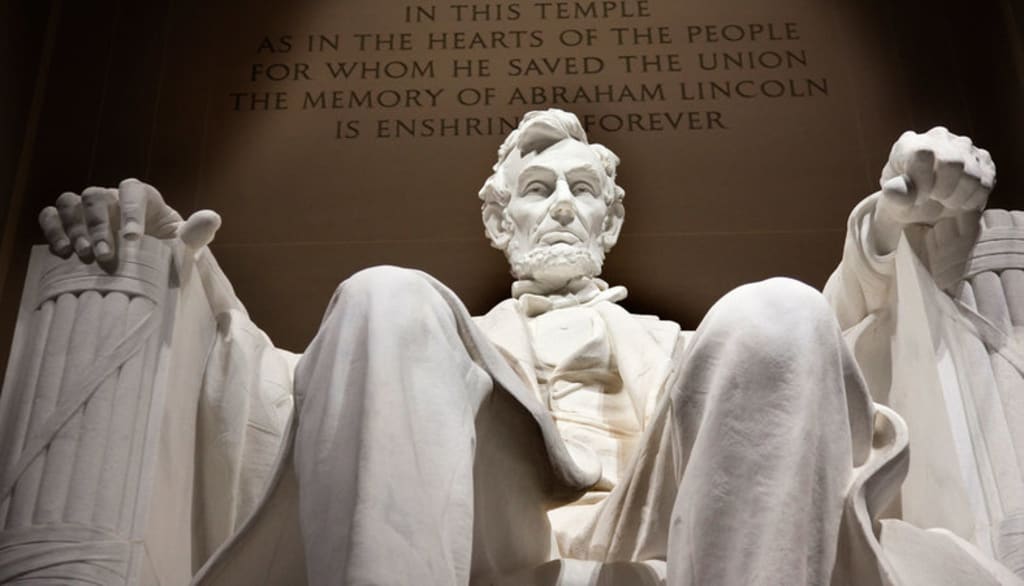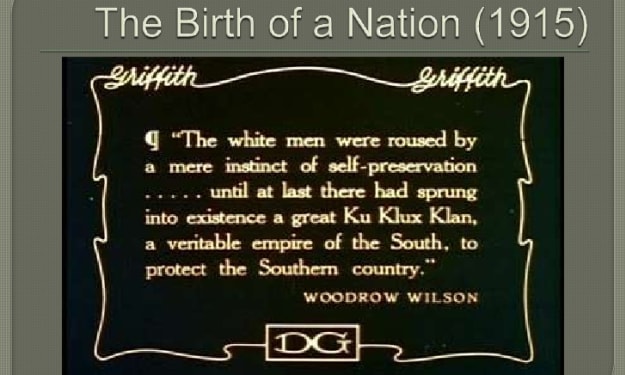Legacy of the Confederacy Part IV
Was Lincoln Against Slavery?

Just southwest of the White House, a massive statue of Abraham Lincoln upon a throne sits in a building designed to resemble an ancient Greek temple. Like a god, Lincoln looms over those who stand before him indifferently. The message is clear: We are all equal, and beneath him.
Steven Spielberg’s film Lincoln perpetuates the image of the sixteenth president as a messiah, savior to the black slaves and white men alike. While historians today universally laud Lincoln as a hero, his reputation as a villain still lingers in the imaginations of some white southerners. I doubt that the 2012 movie did much to change their minds considering that it focused only on a snapshot of Honest Abe’s life.
Constitutional and economic questions aside, Lincoln’s opinion of slavery has been a point of contention for Confederate apologists. Spielberg depicts Lincoln at a time in his life when he was dedicated to ending slavery, but there’s little mention of what led him to that point; it’s implied that Lincoln, like Jesus, was born morality personified.
Did Lincoln want to free the slaves? Or did Lincoln wish to preserve slavery? The answer is both. Abraham Lincoln’s political views are hard for us to grasp today because he was a rare individual who possessed the capacity for change. This entry in my Legacy of the Confederacy Series will examine three chapters of Lincoln’s life that highlight his “evolving” views on slavery.
Lincoln Before the War
Lincoln’s 1860 election and the subsequent succession of South Carolina from the United States is considered the flashpoint for the Civil War, but it was not spontaneous. Debates on whether or not slavery should be allowed in newly acquired territories had been ongoing for decades. Slaves were fleeing their captors and the massive revolution that occurred in Haiti, in which downtrodden Africans overthrew their white oppressors, had wealthy white southern men worried that their days were numbered.
At that time, the majority of slaves in the U.S. were concentrated in the southern states; in fact, nearly 60 percent of South Carolinians were black slaves, human beings who weren’t considered American citizens even if they were born here. The Republican party’s platform was against expanding slavery, but paranoid southern politicians feared that a Republican president would go even further and try to end it altogether. S.C. politician Alfred P. Aldrich made the pitch in a 1860 speech:
“If the Republican party with its platform of principles, the main feature of which is the abolition of slavery and, therefore, the destruction of the South, carries the country at the next Presidential election, shall we remain in the Union, or form a separate Confederacy?”
Ironically, Abraham Lincoln did not want to end slavery in America at that time, which he made explicit in his inauguration speech. Nonetheless, fear prevailed, and succession was a foregone conclusion before Lincoln even took office. Lincoln later explained his position on slavery in a letter he sent to a Kentucky newspaper editor:
“I am naturally anti-slavery,” Lincoln wrote. “If slavery is not wrong, nothing is wrong...And yet I have never understood that the Presidency conferred upon me an unrestricted right to act officially upon this judgment and feeling. It was in the oath I took.”
Unlike Robert E. Lee, Lincoln was first and foremost loyal to the U.S. Constitution. Indeed, slavery still remains in the official text of U.S. Constitution. Secession, however, is nowhere to be found in the founding document. In Lincoln’s eyes, South Carolina’s leaders were behaving unconstitutionally, and he was not going to have it.
In an interview with NPR, historian and Lincoln biographer Ronald White clarifies, “Lincoln did start the war to save the Union; he did not start the war originally to free the slaves.” Nonetheless, abolition “became a purpose for him when he realized that he could no longer move forward without a true understanding of liberty and union...so it becomes the second purpose of the Civil War."
By 1864, ending slavery was part of the Republican Party’s platform, and Lincoln’s re-election campaign slogan was 'Liberty and Union.' Today, he might be called a flip-flopper or a fair weather politician, but it took persuasion from another important American to change Lincoln’s mind.
Lincoln During the War
As Lincoln came to believe that reconciliation between North and South required the end of slavery, he came up with some odd proposals. In 1862, he held a “Deputation of Free Negroes” meeting at the White House. It was the first time in history African Americans had been invited to discuss American policy. Ironically, it was to discuss sending all black people to present-day Panama.
“You and we are different races,” Lincoln told his guests, five well-to-do free African American men living in D.C. “But for your race among us, there could not be war...without the institution of Slavery and the colored race as a basis, the war could not have an existence.” At this time, it was clear that Lincoln’s top priority was ending the white man’s war.
However, Lincoln wasn’t just proposing resettlement; he wanted black people to lead U.S. colonization efforts in Central America. The president announced he needed, “intelligent colored men capable of thinking as white men,” and he implored his guests to “sacrifice something of your present comfort” and “do something to help those who are not so fortunate as yourselves.” This was not a half-baked idea; congress had already set aside thousands of dollars to make it happen.
Unsurprisingly, Lincoln’s guests were unenthusiastic. When author and former slave Frederick Douglass heard about the proposal, he called it “silly and ridiculous.” Indeed, Douglass was very critical of Lincoln in the early days of his presidency. He considered “Honest Abe” politically and morally weak for personally opposing slavery while going out of his way to appease white slave owners. However, the two men eventually became allies in abolition.
A month after his unfruitful meeting, Lincoln announced the preliminary Emancipation Proclamation, which would end slavery in the Confederate states. He was very clear that the decision was part of his war strategy, and slavery still persisted in parts of the Union. Nonetheless, Douglass applauded the move, and he was thrilled when Lincoln called on black men to enlist in the U.S. Army. Douglass helped recruit hundreds of black soldiers, including two of his sons. In Douglass’s eyes, the president was finally starting to see black men as citizens. Douglass wrote in an op-ed, “Once let the black man get upon his person the brass letter, U.S.... a musket on his shoulder and bullets in his pocket, there is no power on earth that can deny that he has earned the right to citizenship.”
Yet there were bumps in the road. When Douglass discovered that black soldiers weren’t receiving the same pay as white soldiers, he ceased his recruitment efforts and requested a meeting with the president. Douglass was surprised to actually receive an invitation to the White House. Lincoln said he shared Douglass’s concern, but he contended that allowing black soldiers into the American military was already a controversial issue. He was afraid of moving faster than public opinion, which could cause him to lose the support of white “moderates.”
“We had to make some concessions to prejudice,” Lincoln told Douglass. Nonetheless, he added, “I assure you, Mr. Douglass, that in the end they shall have the same pay as white soldiers.” Douglass left still frustrated, but he was satisfied enough to resume recruiting soldiers for the Union. Within months, black soldiers were receiving equal compensation.
A year later, it was Lincoln who called Douglass to the White House. The president feared losing the coming election, which would mean he’d be passing a truly divided nation to his successor. The Confederate leaders refused to take any peace deal that didn’t preserve slavery, and white moderates in the North believed that peace was possible without freeing the slaves. However, Lincoln knew that compromising with the southern states would only kick the problem down the road. As long as slavery remained legal, history was bound to repeat itself. So he asked Douglass to go the the South and spread the news of emancipation, and tell ex-slaves they were welcome in the Union.
In his autobiography, Douglass writes that he noticed a change in the president during this meeting. “I was the more impressed by his benevolent consideration,” Douglass notes, “because he before said, in answer to the peace clamor, that his object was to save the Union, and to do so with or without slavery. What he said on this day showed a deeper moral conviction against slavery than I had ever seen before in anything spoken or written by him.”
This is roughly the time period when Spielberg's film picks up. Lincoln was reelected, and the 13th amendment, which permanently ended slavery in all states, was ratified in January 1865.
Lincoln After the War
Lincoln was assassinated by terrorist John Wilkes Booth on April 26, 1865, just two weeks after Confederate General Robert E. Lee surrendered. In a speech years later, Frederick Douglass contended that Lincoln “was preeminently the white man’s President, entirely devoted to the welfare of white men. He was ready and willing at any time during the first years of his administration to deny, postpone, and sacrifice the rights of humanity in the colored people to promote the welfare of the white people of this country.”
While this sounds like a condemnation, Douglass didn’t begrudge Lincoln; he actually praised him for his political prowess:
“His great mission was to accomplish two things: first, to save his country from dismemberment and ruin; and, second, to free his country from the great crime of slavery...Had he put the abolition of slavery before the salvation of the Union, he would have inevitably driven from him a powerful class of the American people and rendered resistance to rebellion impossible.”
In other words, Douglass argued that Lincoln couldn’t have ended slavery without playing the political moderate. In the end, Douglass’s admiration for Lincoln is clear:
“Surveying the end from the beginning, infinite wisdom has seldom sent any man into the world better fitted for his mission than Abraham Lincoln.”
Lincoln was not a god, nor was he sent by one. He remains, however, an inspiration for anyone who believes that people can change.
Sources:
http://www.npr.org/2012/11/22/165671751/we-ask-a-historian-just-how-accurate-is-lincoln
https://en.wikipedia.org/wiki/South_Carolina_in_the_American_Civil_War
https://owlcation.com/humanities/Why-Frederick-Douglass-despised-then-loved-Abraham-Lincoln
About the Creator
Robert Wells
Robert Wells is a freelance writer from North Carolina. His specialties include history, film and video games.






Comments
There are no comments for this story
Be the first to respond and start the conversation.